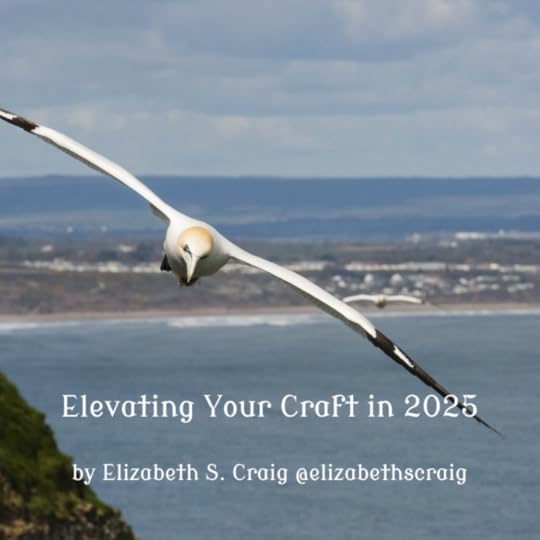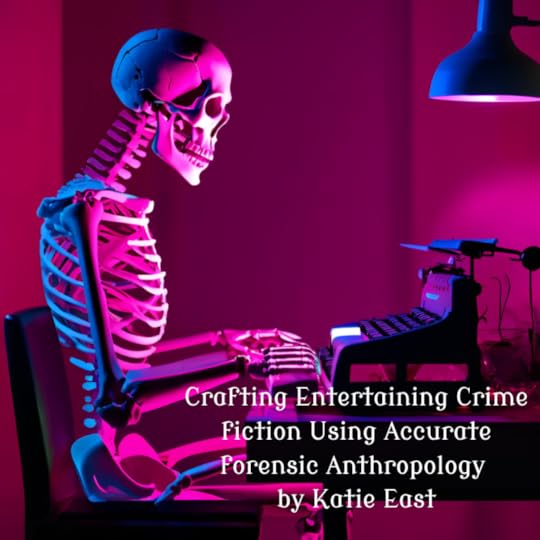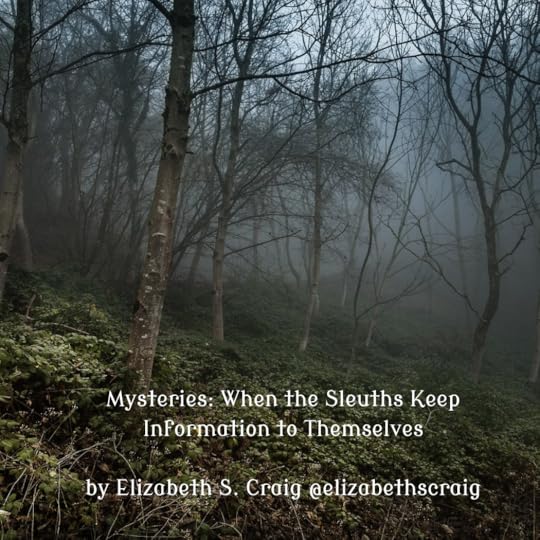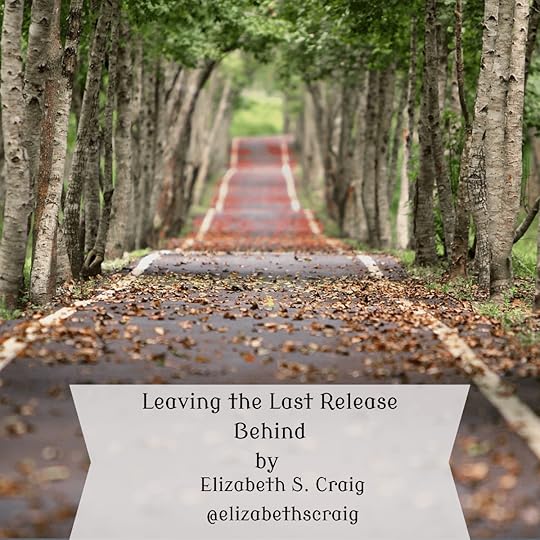Riley Adams's Blog, page 6
January 26, 2025
Elevating Your Craft in 2025
by Elizabeth S. Craig, @elizabethscraig
I’m always looking for ways to improve as a writer. Sometimes, the information out there on the writing craft can be a little overwhelming. Actually, it can be a lot overwhelming. But there are small steps you can take that can make a big impact on your writing.
5 Tips to Improve Your Craft in 2025Read Widely: This is a tough one for me, because I always naturally gravitate toward mysteries. But reading widely and intentionally has made a difference in my writing. Make a commitment to diversify your reading list by including genres outside your comfort zone and analyze the writing techniques used in works you admire.
Consider your dialogue tags: This is a small tweak that can make a big difference. Think about cutting back on tags (he said, she exclaimed) and replacing them with action beats.
Instead of: “I don’t want to go,” she said nervously.
Try: “I don’t want to go.” She twisted the hem of her shirt, her eyes darting to the door.
Vary Your Sentence Structure: Mix short, punchy sentences with longer, more complex ones to create flow and help with pacing.
Embrace Feedback and Criticism: Seek out constructive criticism from writing groups, beta readers, or professional editors. Learning to receive and apply feedback can make a huge difference to your writing.
Targeted Revision: Revision can seem like an insurountable task sometimes. To break it down, focus on one specific aspect during each revision pass (just description, just the subplot, just the dialogue).
These are just a few fairly easy ways to make your book better this year. What other tips can you add to the list?
Elevating Your Craft in 2025:
Share on X
Image by Robert1709 from Pixabay
The post Elevating Your Craft in 2025 appeared first on Elizabeth Spann Craig.
January 18, 2025
LitLinks

by Elizabeth S. Craig, @elizabethscraig
LitLinks are fed into the Writer’s Knowledge Base search engine (developed by writer and software engineer Mike Fleming) which has over 70,000 free articles on writing related topics. It’s the search engine for writers. While you’re there, check out the Writer’s Digest award-winning Hiveword novel organizer.
Have you visited the WKB lately? Check out the new redesign where you can browse by category, and sign up for free writing articles, on topics you choose, delivered to your email inbox! Sign up for the Hiveword newsletter here. Follow the WKB on Facebook here.
No post tomorrow, in observance of Martin Luther King day. I’ll see you back here next Sunday.
Book Proposals, Writing Non-Fiction, And Supercommunicators With Charles Duhigg: from Joanna Penn5 Significant Benefits of a Writing Coach: by Leigh Shulman10 Creative Writing Prompts to Fuel Your Inspiration: by Leigh ShulmanWriting About Holidays: by Linda S. ClareWhat are Project Mood Boards and Why Do You Need One? by Suzanne Lieurance7 Thrillers With Couples Who Don’t Get (Or Deserve) A Happy Ending: by Darby Kane9 Novels That Capture the Complexity of Sisters: by Lilli Sutton8 Gripping Novels Based on Real Murders: by Midge Raymond8 Powerful Poetry Collections Exploring Mental Health: by Neil Hilborn15 Small Press Books You Should Be Reading This Winter: by Wendy J. FoxBody Doubling for Writers: by Javacia Harris BowserTransitioning from non-fiction to fiction? Enjoy uncertainty and trouble: by @rozmorris.bsky.socialWhy We Can’t See Our Tpyos: by D. Wallace PeachAvoiding Writer Burnout: by Margot ConorWhat That AARP “Guide to Become a 60-Something Debut Novelist” Got Wrong: by Linda K SienkiewiczMaintaining Health and Creativity as a Writer : @theIWSGTo finish or not to finish: by Anne JanzerWhen Writers’ Online Presence Irritates Readers: by Kristen ArnettUnboxing Your Creativity: A Story and a Gift: by Alison Hammer @writerunboxed.bsky.socialCelebrate Your Embarrassing Past: by Tiffany Yates MartinCreative Clarity: Focus, Self-Care, And A Little Bit Of Tough Love: by Joanna PennCrafting Entertaining Crime Fiction Using Accurate Forensic Anthropology: by Katie EastThe late Dame Maggie Smith as a crime fiction character/performer: @mkinberg.bsky.socialHow Misunderstanding Can Drive a Plot in Crime Fiction: by Alex KennaWritten Communication as an Element in Crime Fiction: @mkinberg.bsky.socialIn business books, what makes for an effective set of case studies? by Josh BernoffShould You Write a Novel or a Screenplay? by David ListHow to Structure a TV Series – Script Advice: by Yvonne GraceStorytelling on Screen: Would Your Novel Work for Film or TV? by Maggie SmithThe First Marketing Tool for Writers: Your Short Pitch: by Karen WhitingBuilding Our Writing Brand with Authenticity and Consistency: by Katherine Hutchinson-Hayes11 Ways to Update Your Online Presence: by Jacqui MurrayA Charity Crime Fiction Anthology to Benefit LA Fire Victims: @mkinberg.bsky.socialHow to become a ghostwriter with a six-figure income: by Josh BernoffCanada’s Copyright Crisis: In Light of the Trudeau Resignation: by Porter AndersonCover Me: a critical look at book covers: by Rebecca ForsterBest of Writer Beware: 2024 in Review: @victoriastrauss.bsky.socialIs In Medias Res a Good Way to Open a Story? by Oren AshkenaziCharacter Secret Thesaurus Entry: Being Pregnant: by Angela AckermanHolidays, Belief Systems, and a Character’s Journey: by Heather Webb @writerunboxed.bsky.socialHow to Make Your Characters Memorable: by by Karen CioffiSix Battle Mistakes Writers Make, and How to Fix Them: by Oren Ashkenazi8 Unexpected Things to Learn about Writing from Charles Dickens & Ebenezer Scrooge: by James C. MagruderQuick Foreshadowing Tip: Misdirection: by PhysalianHow to Write an Anecdote: Bring Your Nonfiction to Life: by Jerry B. JenkinsWatch Out for Pesky Adverbs and “Weasel Words”: by CS LakinWriting Powerful Moments: by N.L. Holmes5 Writing Styles: Definitions and Examples: by Linda O’DonnellA Charlie Brown Christmas Beat Sheet Analysis: by Don Roff5 Weird Tricks To Help You With Your Grammar & Punctuation: from Bang2writeRevising vs Editing: What’s the Difference? by Robinette WatersonTop 3 Strategies Book Editors Use to Perfect Manuscripts: by Leigh ShulmanWhat to Describe in a Scene: by Marilynn ByerlyWorld-Building and Genres: by Gabriela Pereira
The Top Writing Links From Last Week Are On LitLinks:
Share on X
The post LitLinks appeared first on Elizabeth Spann Craig.
January 12, 2025
Crafting Entertaining Crime Fiction Using Accurate Forensic Anthropology
by Katie East
A well-crafted crime and the ensuing investigation are at the heart of any good crime fiction story. When that crime involves a mysterious death, incorporating accurate forensic anthropology can ensure the story is believable, logical, and entertaining. But where do you even start? My name is Dr. Katie East, I am a board-certified forensic anthropologist and avid reader of crime fiction, and I am here to help.
What is forensic anthropology (and what it is not)Forensic anthropology is the investigation of human remains in a medical or legal context. Forensic anthropologists at a crime scene are just one member of a large team of experts and their responsibility is limited to the body and the immediate surroundings. They provide information to assist in the identification of unknown skeletal remains and the reconstruction of circumstances surrounding the death of an individual.
To accomplish these tasks the anthropologist is an expert in estimating biological sex, age, ancestry (which is similar to the concept of race), and height. They can also assess traumatic injuries and the processes that effect human remains after death (a study called taphonomy). Due to their expertise in identifying environmental changes resulting from a decomposing body and small fragments of human bone, forensic anthropologists will also be involved in, or even lead, searches for human remains or clandestine graves.
Forensic anthropology is not: chasing suspects, interrogating witnesses, digging up dinosaurs, fingerprint or blood spatter analysis, DNA analysis, carrying a gun, etc.
Why accuracy mattersWhile most of your readers will not be forensic scientists (although you may be surprised how many are), incorporating accurate forensic anthropology can still improve your story by enhancing believability, logical consistency, and entertainment.
Believability: Most readers have seen various television shows and documentaries that discuss forensic science, thus they may know bits and pieces of real science. Therefore, any falsehoods or inaccuracies could jar them out of the fictional world you have crafted. Logical consistency: The crime sets a foundation for many chapters of investigation and intrigue. Basing the crime and investigation on real processes can provide structure to your story and doesn’t require you keep track of imagined facts and methods to ensure consistency.Entertainment: The imaginations of writers are impressive, but so too are those of forensic anthropology researchers and (unfortunately) real criminals. Therefore, the scholarly literature on forensic anthropology offers an immense array of unique and intriguing facts and real examples that can benefit your story. Some recent research has examined the effects of the following on bones and human remains: sharks, woodchippers, lawn mowers, concrete, hydrochloric acid, Coca Cola, wild vs domestic dogs and so much more. How to make your anthropology convincingTo make the forensic anthropology in your story accurate requires serious preparation and research (the resources at the end can help!) but here are some tips to get you started:
In science, nothing is 100%: Forensic anthropologists must rely on published studies and methods. That means that estimates are reported in terms of a probability or range of values. For example, a reasonable age estimate might be “25-35 years”, but never “25.5 years” and a reasonable biological sex estimate would be “a 75% likelihood of being male”, but never “definitely male”.The forensic anthropologist stays in their lane: Forensic anthropologists can only investigate skeletal tissue, which limits the conclusions they can reasonably draw. For example, forensic anthropologists cannot tell if an injury took place two days before death, at death, or three days after. Therefore they cannot identify cause of death and instead contribute information about circumstances around death to the medical examiner. Don’t fall for common myths: Myths about human bodies and what happens to them during and after death are abundant, so it pays to fact check any preexisting assumptions you may have before adding it to your story. Some common and incorrect myths include: males have less ribs than females, skulls explode in fire, bite marks can be matched to a person, and skeletal tissue is replaced completely every 7 years. SummaryAccurate forensic anthropology can make your crime fiction more believable, logical, and entertaining. Making the science in your story accurate takes work, but knowing that science always speaks in probabilities and ranges, that forensic anthropologists stay in their lane, and to fact check your assumptions are great places to start.
If you are ready for a deep dive into forensic anthropology consider checking out the resources on my website: https://www.katieeastphd.com/for-writers, including “A Crime Fiction Writer’s Guide to Forensic Anthropology” and 30 minute Crime Writer’s Consultations.
Katie East is a board-certified forensic anthropologist and science communicator. By day she analyzes skeletons and by night (and weekends) she educates public audiences about all things forensic anthropology. With over a decade working in museums, laboratories, and field settings, Katie offers a broad range of insights about anthropology and science to audiences of all ages. Katie has been a professional forensic anthropologist since 2018 and received her PhD in 2021.
Note from Elizabeth: I’m guest posting, myself, today. :) Find me at the wonderful IWSG blog.
How forensic anthropology can make your stories more compelling—from board-certified expert Dr. Katie East:
Share on X
The post Crafting Entertaining Crime Fiction Using Accurate Forensic Anthropology appeared first on Elizabeth Spann Craig.
January 11, 2025
LitLinks

by Elizabeth S. Craig, @elizabethscraig
LitLinks are fed into the Writer’s Knowledge Base search engine (developed by writer and software engineer Mike Fleming) which has over 70,000 free articles on writing related topics. It’s the search engine for writers. While you’re there, check out the Writer’s Digest award-winning Hiveword novel organizer.
Have you visited the WKB lately? Check out the new redesign where you can browse by category, and sign up for free writing articles, on topics you choose, delivered to your email inbox! Sign up for the Hiveword newsletter here. Follow the WKB on Facebook here.
My 2025 Creative And Business Goals With Joanna Penn: Following an Editor’s Advice—or Not: by Barry Knister @writerunboxed.bsky.socialWhat If You’re Writing Novellas? Now What? by Tara Deal @janefriedman.com30 Dystopian Story Ideas and Prompts: by Emily ParkCrime Fiction: In The Spotlight: Roboert Thorogood’s The Marlow Murder Club: @mkinberg.bsky.social9 Books That Will Make You Reconsider Florida Stereotypes: by John Brandon12 Poems That Break the Silence on Disability and Illness: by Holly Kybett SmithCreate Sustainable Writing Habits: by Elizabeth CraigThe Paradox of Writing: by James R. PrestonPursuing Your Passion and Paying It Forward: by Becca PuglisiEvery Story is a War: by James Scott BellWeathering Disruption with Creativity Intact: by Sandra TaylerThe power of small adjustments for writers: by Daphne Gray-GrantIWSG takes over Reedsy’s Creative Writing Prompts with 5 post-holiday themed prompts: Six Fantastic Uses of Magic in Popular Stories: by Oren AshkenaziSaskatchewan as a Crime Fiction Setting: @[email protected]Privilege as an Element in Crime Fiction: @[email protected]How to Take Control of Your Nonfiction Writing Career: by Nina AmirHow to Write Acrostic Poems – Creative Tips: from The Art of NarrativeDon’t Let Circumstances Get In the Way of Blogging: by Nina AmirAI: The Secret Weapon in Finding a Book’s True Audience: by Brittany PinneyUpdated Terms to Meta Platforms in 2025: by Sue ColettaWhat’s Happening in the Writer’s World–Pinterest Buyable Pins or TikTok Shop? by Jacqui MurrayHelp (for public speaking anxiety) is on the way: by Gigi RosenbergKarma’s a Bitch: The Law Catches Up With PageTurner Press and Media: @victoriastrauss.bsky.socialPublishing Legacy Projects: One Woman’s Story: by Marcy McCrearyAAP’s October StatShot: The US Market Was Up 8.3 Percent: by Porter AndersonLondon’s Westminster Book Awards Issue Their 2025 Shortlists: by Porter AndersonThe IPA Opens 2025 Prix Voltaire Nominations: by Porter AndersonThe German Book Market in 2024: ‘Slightly Higher’ Revenue: by Porter AndersonAre There Advantages to Traditional Publishing? by Karen CioffiWhen Royalty Language in Publishing Contracts Isn’t What it Seems: @victoriastrauss.bsky.socialScams, Hacks, and Red Flags: How to Protect Yourself: by Penny SansevieriDon’t Get Scammed! Information Every New Author Needs to Know: by Liz GauffreauOutlaw Archetype: Definition, Examples, and Writing Tips: by Polly WattIs Hero Reputation Important? by Charles YallowitzThree-Act Analysis of Pride and Prejudice: by Gabriela PereiraAnalogy vs Metaphor vs Simile: Differences and Examples: by Randal GilmoreHow to Use Exposition to Evoke Emotion: by Chris WinkleTop 15 Unwritten Rules Of Writing: How Many Do You Know? by Lucy V HaySimplifying the Story: from MythcreantsHow Do I Make Sure a Sacrifice in a Story Matters? by Oren AshkenaziWriting Stories: Three Essentials: by Linda S. ClareHot, Warm, and Cold Viewpoint: by Marilynn ByerlyTelling the Whole Story: The Key to Writing Multiple POV: by Lisa Williamson RosenbergA Successful Critique Group’s System: by Ann GordonHow to Write Vivid Descriptions Without Overloading: from 3hksTrickster Archetype: Definition, 15 Examples, and Tips: by Brandi BadgettWords that Pack a Punch: by Jan Sikes5 Valuable Writing Tools That Helped Me Succeed This Year: by Colleen M. Story
The Top Writing Links From Last Week Are On LitLinks:
Share on X
The post LitLinks appeared first on Elizabeth Spann Craig.
January 5, 2025
Create Sustainable Writing Habits
by Elizabeth S. Craig, @elizabethscraig
Happy New Year! I hope you have a great 2025. I’m still trying to get beyond the feeling that “2025” is squarely in the Jetson’s category.
If you’re like a lot of writers, you might be looking at ways to develop a writing habit this year. Not all writers are routine-driven (sometimes routines can make people feel more anxious than less so), so be sure to change tacks if this advice doesn’t work fo you.
Set realistic goals.
This is something you’ll read about over and over again online, to the point that it becomes background noise. But it really does help. I’m talking about a goal you could meet even on your worst days. 5 minutes a day, opening up your document on your device, brainstorming a list of characters or settings for 3 minutes, etc. The point is really the habit and not necessarily the output.
Have a dedicated writing space.
This doesn’t mean you have to have a home office. In fact, I’ve never had a home office in my entire writing career. It can be a comfortable chair or a spot at the kitchen table that you don’t usually sit at. It’s a place that, when you sit there, means you’re going to work on your project.
Become part of a writing community.
Connect with other writers through blogs, local groups, or online forums on Facebook and other social media. Having a support system can provide motivation, accountability, and valuable feedback on your work.
Are you the type of writer who does better with a routine/habit? If so, what tips can you add?
Create a Sustainable Writing Habit:
Share on X
The post Create Sustainable Writing Habits appeared first on Elizabeth Spann Craig.
January 4, 2025
LitLinks

by Elizabeth S. Craig, @elizabethscraig
LitLinks are fed into the Writer’s Knowledge Base search engine (developed by writer and software engineer Mike Fleming) which has over 70,000 free articles on writing related topics. It’s the search engine for writers. While you’re there, check out the Writer’s Digest award-winning Hiveword novel organizer.
Have you visited the WKB lately? Check out the new redesign where you can browse by category, and sign up for free writing articles, on topics you choose, delivered to your email inbox! Sign up for the Hiveword newsletter here. Follow the WKB on Facebook here.
Happy 2025!
Looking Back to Plan Ahead: by Tiffany Yates MartinWriting Resolutions for 2025: by Brian Andrews30+ Inspiring Fiction Writing Prompts: by Angie AndriotCrime Fiction: In The Spotlight: Tamron Hall’s As the Wicked Watch: @mkinberg.bsky.socialCrime Fiction: In The Spotlight: Cat Connor’s Terrorbyte: @mkinberg.bsky.social7 Thought-Provoking Books About Models and the Dark Side of Beauty: by Laura Elizabeth Woollett at Electric LiteratureThe Most Popular Lit Hub Stories of 2024: Lit Hub’s 50 Noteworthy Nonfiction Books of 2024: The Best Nonfiction Crime Books of 2024: from Crime ReadsMy Favorite Book-to-TV Adaptations of 2024: by Maris Kreizman10 Heartwarming Japanese Books Perfect for Cozy Nights: by Claudia GuthriePrint vs. eBooks: by Kay DiBiancaTen Children’s Books To Read and Enjoy Before The Year Ends: by Caroline Carlson8 Books about Women Keeping Secrets: by Midge RaymondCelebrate the New Year with These 8 Novels About New Beginnings: by Katie Bloomer8 Craft Books to Inspire Your New Year’s Writing Resolutions: by Claudia GuthrieA Refuge for the Soul: How to Build a Library, According to Montaigne: by Andrew HuiZoom Accountability for Writers: by Debbie BurkeFive Things to Try When You Hit Writer’s Block: by S.M. Carrière10 Foundational Truths to Help Us Remain Steadfast as Writers in the Year to Come: by Edie MelsonWriters on Not Writing: Elisha Emerson and Emma Bouthillette: from The Masters ReviewEqual and Opposite: by Steven PressfieldThis Year in Books (2024): by Nathan BransfordHow To Write When Everything’s on Fire: by Elias McClellanAre you deciding between writing projects? by Daphne Gray-GrantI Love You, You’re Perfect, Now Change: by Greer Macallister @[email protected]Caring for Yourself During Writer’s Burnout: by Renee RobersonYear-End Author Checklist: 15 Things to Refresh, Revamp, and Revise Before the New Year: by Penny SansevieriSupport Your Fellow Writers: by D.L. FinnWhat the MFA Does and Does Not Do for Aspiring Novelists: by Nancy Wayson Dinan @janefriedman.comSpeaking Out Against Injustice as an Element in Crime Fiction: @[email protected]Enriching Characters and Sociopolitics with Digital Currencies: by Libby SchultzHow to Write a Short Story in 6 Steps: by Angie AndriotTips for Cleaning Up Your Blog: by Hugh RobertsHow to Brainstorm Blog Post Ideas for Your Blog or Content: by Kathy WidenhouseYour One-Sentence Summary: by Randy IngermansonTop 10 Book Marketing Articles from BookBub in 2024: by AJ Yee5 Ways Authors Can Disrupt Their Marketing (in a Good Way): by Penny SansevieriHow to Market Your Book Without Social Media: by Penny Sansevieri21 Ways Authors Delighted Their Facebook Followers in 2024: by Rick BurnesMy 2024 Year-End Review: Most Notable Publishing Industry Developments: @janefriedman.comListen up! Why 2024 was the year of the audiobook: by Ellen Peirson-HaggerShould I Self-Publish? by Sarah Rhea Werner#1 Error That Kills Interest In Your Pitch 100% Of The Time: from Bang2writeQuery Letter Examples: by Shane MillarHow to Build Resilience – So You Can Bounce Back from Rejection: Failing the Reality Check: Independent Literary Recognition Guild and Acquisition Database: @victoriastrauss.bsky.socialMaking Readers Care on Page One: by Elaine DodgeCharacter Secret Thesaurus Entry: Is Safeguarding Someone’s Secret: @angelackerman.bsky.socialHow to Turn Good Dialogue into Great Dialogue: by CS LakinWriting: Your Novel’s Ending: by Linda S. ClareFive Stories That Suffer From Too Little Movement: byOren AshkenaziHow to Write a Book Review That People Actually Want to Read: by Leigh ShulmanHow Long Should a Chapter Be? by James Scott BellYour Story Should Be Up, Down, and All Around: by Karen CioffiPros & Cons Of Writing A Prologue: 6 Key Things To Consider: from Bang2writeHow to fix a ghostwriting (or other freelance) project that’s gone awry: by Josh BernoffWriting with 3 Equal-sized Acts: by September C. FawkesWriting Crafts Articles for Children’s Magazines: by Suzanne LieuranceStructural Words of Wisdom: compiled by Dale Ivan SmithWriting The Other And Self-Publishing in South Africa With Ashling McCarthy: Writing Your Character’s Internal Thoughts: by Karen CioffiFame vs Infamy: by Charles YallowitzFinding Power When We Find our Point of Difference and Write From There: by Sarah Sally HamerTips to Turn Sketchy Writing into Robust Prose: by CS LakinFive Secrets to Perfect Pacing: by Hank Phillippi RyanStory Movement Via Readers’ Experiences of Human Moments: by Donald Maass @[email protected]Writing in First Person Personal: by PeggySue WellsSix Secrets to Writing from the First Person Point of View: by Hank Phillippi RyanSnowflake Method: 7 Steps to Outline a Story: by Shane MillarA vow for the new year: never rewrite without a plan: By
Josh Bernoff175 Positive Adjectives to Use in Description: by Linda O’DonnellCreate Compelling Suspense and Tension No Matter What’s Happening in Your Story: by Tiffany Yates Martin @janefriedman.comCharacter Based Transitions: by Terry Odell
The Top Writing Links From Last Week Are On LitLinks:
Share on X
The post LitLinks appeared first on Elizabeth Spann Craig.
December 22, 2024
LitLinks

by Elizabeth S. Craig, @elizabethscraig
LitLinks are fed into the Writer’s Knowledge Base search engine (developed by writer and software engineer Mike Fleming) which has over 70,000 free articles on writing related topics. It’s the search engine for writers. While you’re there, check out the Writer’s Digest award-winning Hiveword novel organizer.
Have you visited the WKB lately? Check out the new redesign where you can browse by category, and sign up for free writing articles, on topics you choose, delivered to your email inbox! Sign up for the Hiveword newsletter here. Follow the WKB on Facebook here.
Happy holidays, everyone! I’ll be back here on Sunday, Jan. 5. :)
How to Describe Your Target Readership So It’s Meaningful to Agents and Publishers: @janefriedman.comFive Works About Surviving Helpful or Indifferent Aliens: by James D NicollThe Many Alt-Histories of World War II: by Jeremy Zentner from SFWAResistance Comes Second: by Steven PressfieldApplying “Just Do It!” to the Writing Life: by Crystal BowmanThe Pain of Writing: by Erik BorkWriting Past Discouragement: by James Scott BellFive Fears of Writers (and How to Defeat Them): by Michelle BarkerHow I’d Rewrite My Already Published Book: by Shannon A. Thompson5 Myths About Tarot That Storytellers Should Know: by Kris WaldherrWhy you shouldn’t pull all-nighters: by Daphne Gray-Grant21 (and a half) Ways to Write Funny for Kids: by Vicky LorencenWriting Memoir And Dealing With Haters With Natalie Maclean: from Joanna PennMysteries: When the Sleuth Keeps Information to Themselves: Disney Films With Characteristics of Crime Stories: @mkinberg.bsky.social“Love Bombing” as an Element in Crime Fiction: @mkinberg.bsky.socialHow Long is a Short Story? Unraveling the Mystery of Word Count: by Leigh ShulmanWriting Young Adult Fiction—How is it different from writing adult fiction? by Joy YorkThe Power of Reader Magnets: by Jenn Windrow21 Ways Authors Use Reader Magnets to Grow Subscribers: by Rik Burns at BookBubWriting the Author’s Note for a Novel: by Jennie Liu @janefriedman.comAI-Voiced Audiobooks: New Guidance for Consumer Labeling: by Porter AndersonWriting what you don’t know: how to choose the right career for your characters: by Helena FairfaxCharacter Development: 7 Tips to Utilizing Basic Skills That Might Not Be Basic: by Charles YallowitzFive Common Mistakes That Put Your Heroes in the Wrong: by Oren AshkenaziCan My Hero Inherit Skills? by Oren AshkenaziNever Respond to Rejection Letters and Other Advice for Writers: by Anne M. PillsworthAn Introduction To Kishōtenketsu, Contrast Over Conflict: from Bang 2 Write blogJamie Oliver & How To Write Inclusivity Correctly: by Elaine DodgeHow to Find the Most Telling Details: by Jessica Strawser4 Tactics to Elevate the Suspense in Any Story: by Savannah Cordova @https://buff.ly/3OXODHKHow Many Words in a Chapter? Tips: by Shane MillarPacing Tips for Fiction: by C. S. LakinChoosing a Point of View: Understanding Nuance: by Jami Gold7 Act Structure: What it Is and How to Use it: by Shane MillarWriting: Visualize Your Scenes: by Linda S. Clare
The Top Writing Links From Last Week Are On LitLinks:
Share on X
The post LitLinks appeared first on Elizabeth Spann Craig.
December 15, 2024
Mysteries: When the Sleuth Keeps Information to Themselves
by Elizabeth S. Craig, @elizabethscraig
I’ve read several mysteries lately that have surprised me. For a while, I’ve thought all mystery writers understood that mysteries are meant to be interactive affairs. The reader serves almost as a sidekick, following along with the sleuth as they uncover clues, interview suspects, and draw conclusions. That’s the fun of reading the genre.
But these books all had a part where the sleuth sees something, remembers something or realizes something and doesn’t share it with the reader. It’ll be something like: Mary looked closer at the top of the desk. Her eyes opened wide. Then she quickly left the room, her mind whirling.
One of the “10 Commandments of Mystery Writing” from Ronald Knox (early 20th century mystery writer) was: The detective must not light on any clues which are not instantly produced for the inspection of the reader.
The problem is . . . having the sleuth keep information to themselves is frustrating for readers. They’ve been by your sleuth’s side while finding the victim, interviewing suspects, observing clues and red herrings. And now they’re shut out toward the end?
I get it. These writers are trying to make the reveal of the murderer exciting. There are other ways to accomplish this. One well-tested way is to reveal the sleuth’s big discovery to the reader, follow this up with a moment of danger for the sleuth, then have the denoument where the police are called and the sleuth explains everything (things the reader has put together along with the sleuth).
I’ve glanced over online reviews of these books and see upset reader reviews for books where the sleuths keep clues to themselves. Don’t let this happen to you!
If you read mysteries, have you noticed this phenomenon lately? Have you seen it in TV shows, too (I know I have)?
Sleuths Should Share Clues With Readers:
Share on X
Image by Thanks for your recognition • Donations ♡ welcome from Pixabay
The post Mysteries: When the Sleuth Keeps Information to Themselves appeared first on Elizabeth Spann Craig.
December 14, 2024
LitLinks

by Elizabeth S. Craig, @elizabethscraig
LitLinks are fed into the Writer’s Knowledge Base search engine (developed by writer and software engineer Mike Fleming) which has over 70,000 free articles on writing related topics. It’s the search engine for writers. While you’re there, check out the Writer’s Digest award-winning Hiveword novel organizer.
Have you visited the WKB lately? Check out the new redesign where you can browse by category, and sign up for free writing articles, on topics you choose, delivered to your email inbox! Sign up for the Hiveword newsletter here. Follow the WKB on Facebook here.
How I choose ghostwriting clients: by Josh BernoffHow to hire a coach: by Daphne Gray-GrantTapping Into the Magic of Dreams and Stories: by Megan Mary25 Cozy Fantasy Books for a Relaxing Read: by Emily ParkFive Thinly Veiled Versions of Rome in SF: by James D. Nicoll7 Books of Speculative Feminism Written by Women: by Vanessa Saunders7 Great, Chilling Novels with Young People Taking Charge of Their Lives: by Marie TierneyCrime Fiction: In The Spotlight: Jason Goodwin’s The Janissary Tree: @mkinberg.bsky.social5 Romantasy Novels That Balance World-Building with Relationship Building: by Sarah Hawley“She Is Not Me.” What Reading to Your Children Teaches You About Yourself: by Olivia A. ColeSix Writers on Procrastination: @literaryhub.bsky.socialAuthor Lessons: Indie Publishing, Burnout, Author Extras, Control, and Writing Project Grief: by K.M. AllanFinding Community at a Writers Retreat: by Carol GoodmanAnn Patchett on Annotating Her Award-Winning Novel Bel Canto Twenty Years Later: The Importance of Leaving Your Last Release Behind: The Benefits of Brainstorming for Writers: by Cindy K. SprolesStop Reacting: 10 Choices to Boost Your Writing Career Now: by Colleen M. StoryHow Home Improvements Are Like Writing a Book: by Gabriela PereiraLove Won’t Go: Lessons in Resilience: by Therese Walsh @[email protected]Doubting Yourself Is Not Failing: by Amy L. Bernstein @janefriedman.com27 Reasons to Get Happy: by Dana IsaacsonThe Key to Successful Writing: by Jodi M. Webb“My NaNoWriMo Was a Train Wreck”: by Elinor Florence @janefriedman.comHow to Overcome Writing Anxiety: by Ellen BuikemaHoliday Un-gift Guide (and the Best Nonwriting Books for Writers): by Tiffany Yates Martin6 Tips to Survive Freelancing During the Holidays (Without Losing Your Mind): from The Quiet Type blogWhy Rigid Genre Divisions Are Pointless: by Oren AshkenaziWriter Appearances as an Element in Crime Fiction: @[email protected]What a Picture Book Editor Looks For: by Karen CioffiUSA: A New State ‘Freedom To Read Act’ Bans Bannings of Books: by Porter AndersonHuman Rights Day: The Börsenverein’s Appeal for Boualem Sansal: by Porter Anderson‘Supremacy’ by Parmy Olson Wins the FT and Schroders Award: by Porter AndersonIcelandic Rights Update: After Frankfurt, a Big Uptick in Sales: by Porter AndersonLiterary Agent Interview: Shannon Hassan Interview and Query Critique Giveaway: Interview by Natalie AguirreAfter the Writing: Cover Thoughts: by Anne HawkinsonHow to Make a Fancy Pants Title Page Using Word: by D. Wallace PeachAntagonist vs. Villain: What’s the Difference? by K.M. WeilandFrustration—Your Character’s Catalyst: by Kelley J. P. LindbergCharacter Secret Thesaurus: Choosing Cowardice Over Bravery: by Becca PuglisiThe Reformed Punk Character: by Charles YallowitzCharacter Flaws: The Key to Creating Relatable Characters: by Leigh ShulmanThey’re Not What You Think: A Good Character/Bad Character Surprise: by N.L. HolmesSet Your Protagonist in Motion: @kcraftwriter.bsky.social @[email protected]Don’t Make This Conflict and Tension Mistake: by Janice HardyFour Dialogue Tips: by James Scott BellBackstory Tips and Tricks: by C.S. LakinWriting to a Theme: Questions to Find Your Story’s Heart: by Sarah (Sally) HamerHow to Write a Million-Dollar Bestseller: Advice from Stephenie Meyer’s Writing Mentor: from David FarlandFour Things That Make Your Writing Boring (and how to fix them): by Suzy VadoriTips for Creating Unique Content for Better Results: from The Art of NarrativeHow Specifics Make Your Stories Universal: by Tiffany Yates MartinBalancing “Showing” with “Telling” in Fiction: by C.S. LakinHow to Choose Point of View Characters for Your Novel: by Chris WinkleThree Act Structure: Full Outline, Examples, and Tips: by Shane MillarWriting: Growing Your Scene Tension: by Linda S. Clare8 Elements of Creating Tension in Your Writing: by Margot Conor80 Collective Nouns for Animal Groups: from Writers WriteOnly as Good as Our Tools: Drafting by Hand and Fountain Pens: by Carrie Finch
The Top Writing Links From Last Week Are On LitLinks:
Share on X
The post LitLinks appeared first on Elizabeth Spann Craig.
December 8, 2024
Leaving the Last Release Behind
by Elizabeth S. Craig, @elizabethscraig
I’ve read a lot from writers who liken releasing a book to birthing a child. I totally get where they’re coming from; there are plenty of similarities.
But the difference, in my opinion, is that when you birth a child it’s just the start of the real labor. The real labor is raising that child for the next couple of decades.What you don’t want to do with a book is spend the next couple of decades with it.
It’s usually the time when you need to walk away from it and start your next book. For one thing, it keeps you from being so hyper-focused on your book that you’re devoted to promo and not to creating again. If you love your book, the best thing you can do is hang out with those characters more by writing another adventure for them.
I gave a talk in August last year. The organizers asked if I would be promoting my latest book. I said that I usually gave my book talks more general (I talk about mysteries, the writing life, etc.) and that if I mentioned a book, it would probably be my first in the series.
The talk went well and everyone laughed at the right places. The tech worked without a glitch for my slideshow. Then it was time for the Q&A. One of the questions was for me to give a quick overview of my latest book. I froze. The book had come out two months before, but in the meantime I’d written a whole other book and an outline for another.
I smiled at them, apologized, walked over to the book table and glanced at the back cover copy. Then I walked back to the microphone on the lectern (everyone was howling with laughter by this point, realizing I had absolutely no idea what the book was about). I grinned and gave them a quick rundown on the story. Then I explained how I leave books behind. It’s not that I’m not invested in the books; I spent roughly three months in their creation. But there’s always another story waiting in the wings for me to write it.
I’ll admit that’s a little extreme, ha. But, for me at least, I just don’t have the headspace for more than one book at a time.
Is it tough to leave your most recent release behind? How do you move forward with your writing?
Leaving the Latest Release Behind:
Share on X
The post Leaving the Last Release Behind appeared first on Elizabeth Spann Craig.









